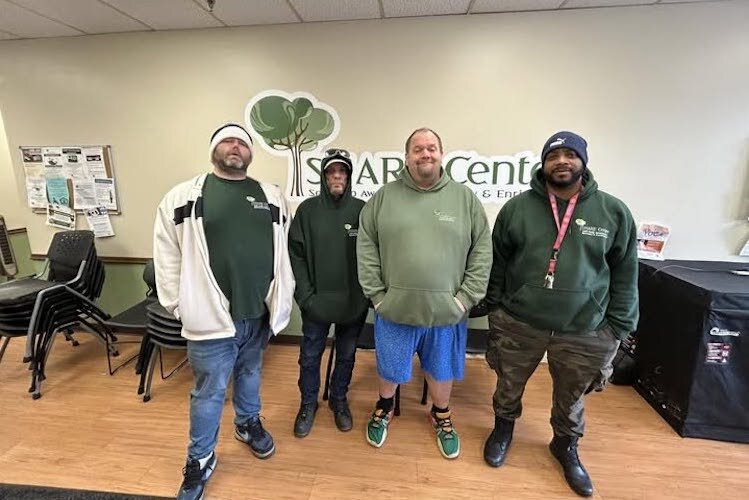Providing emergency overnight shelter comes at a price for Battle Creek’s SHARE Center
“The SHARE Center is the last hope for many people, and the organization faces a very real threat of de-funding by the Federal government, which will result in more needless suffering, more death."
Editor’s note: This story is part of Southwest Michigan Second Wave’s On the Ground Battle Creek series.
BATTLE CREEK, MI — Plummeting temperatures in January saw the SHARE Center and First Congregational Church pivot from their regular operations to ensure that Battle Creek’s unhoused population was fed and sheltered.
That pivot did not come without a price for the SHARE Center. This daytime shelter is now looking to raise $9,000 to replenish funds taken from its food program to provide food and shelter and cover the cost of additional staffing and repairs inside the building after sprinkler heads malfunctioned on February 1.
When the overnight shelter effort began, between 30 and 40 individuals and a smaller number of families were coming in each evening. Families with children were put up in local hotels with the cost covered by the SHARE Center, says Robert Elchert, Executive Director of the organization.
Additional expenses were incurred to pay staff who worked day and overnight shifts at the makeshift overnight shelter. Elchert says about $5,000 was spent to cover staff salaries and the family hotel stays. These were the known expenses. It was the unknown that promoted Jill Anderson, a Community Advocate, to get involved,
On February 7 a GoFundMe page was created by Anderson, who was herself under-housed, something most people don’t know about her. As of Wednesday morning $1,825 has been raised.
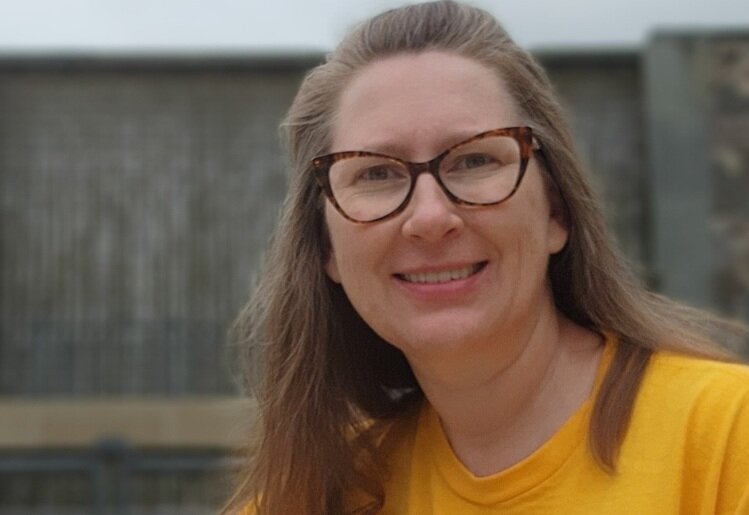
Jill Anderson
“I was under-housed for a period of months as a young mother. Living out of a storage unit and figuring out where to sleep each night was exhausting. I had a hard time thinking, and keeping appointments and filling out endless forms for assistance was strangely challenging,” Anderson says. “Sleep deprivation turns us into zombies. I could afford food, but I could not afford childcare, reliable transportation, or a security deposit. I was so lucky to not have substance abuse issues and to have many compassionate friends -— so our situation was not nearly as bad as others, and we were eventually able to move in with family.”
“Unhoused” refers to someone who lacks a consistent place to live, while “under-housed” refers to a household with too few bedrooms relative to its size.
Anderson says, “Especially now, with so many jobs on the chopping block, and so many of us living paycheck to paycheck, there is not much buffer between ‘normal’ and under-housed people. Add in even just one or two other tricky factors like a difficult marital relationship or a family death, and the possibility of homelessness becomes very real for most of us. So helping in this capacity is my answer to ‘If not me, who? If not now, when?’ I try to leverage any privilege that I have to help others.”
Anderson is part of a community of local residents who joined forces when the SHARE Center remained open after its normal hours of operation as outdoor temperatures slid below 20 degrees. These individuals, 20 in all, received training to better serve those looking for a space to stay warm.
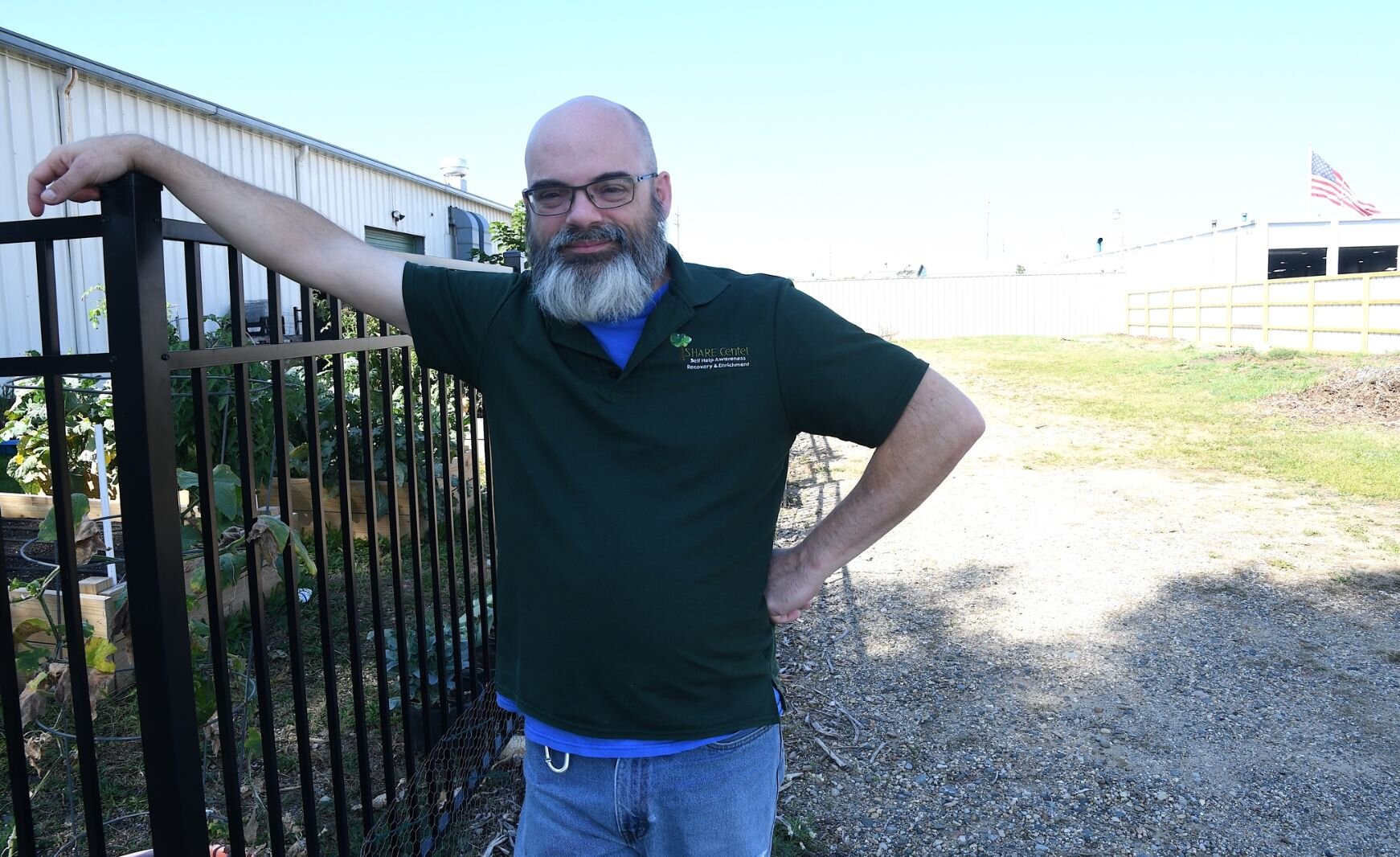
Robert Elchert, executive director of the SHARE Center, stands by a space he hopes will become a developed open recreational space, instead of a vacant field.
Though not zoned as an overnight shelter, Elchert says “We didn’t want people to freeze to death so we opened it anyway. We knew there were a lot of folks who were not going to have a place to stay when we had this life-threatening weather. We knew there wouldn’t be enough room at the Haven and people with severe mental health issues can’t be around a lot of people because it causes them extreme anxiety.”
The SHARE Center was set up as a temporary overnight shelter on January 16. When city officials contacted Elchert to let him know about the zoning issues shelter operations moved to First Congregational Church under the direction of Jaimie Fales, a church member. During this time Mitts to Pits Catering provided barbequed chicken and rib meals that was a budget-reliever for the SHARE Center’s meal program and the Battle Creek Community Foundation BCCF)donated $500 for hotel stays for one of the families.
The overnight shelter at FCC continued until January 27 when these services moved back to the SHARE Center. On February 3, after issues with the sprinkler system forced the temporary closure of the Share Center, shelter operations began again at FCC on February 3. Two days later, the Share Center’s doors re-opened.
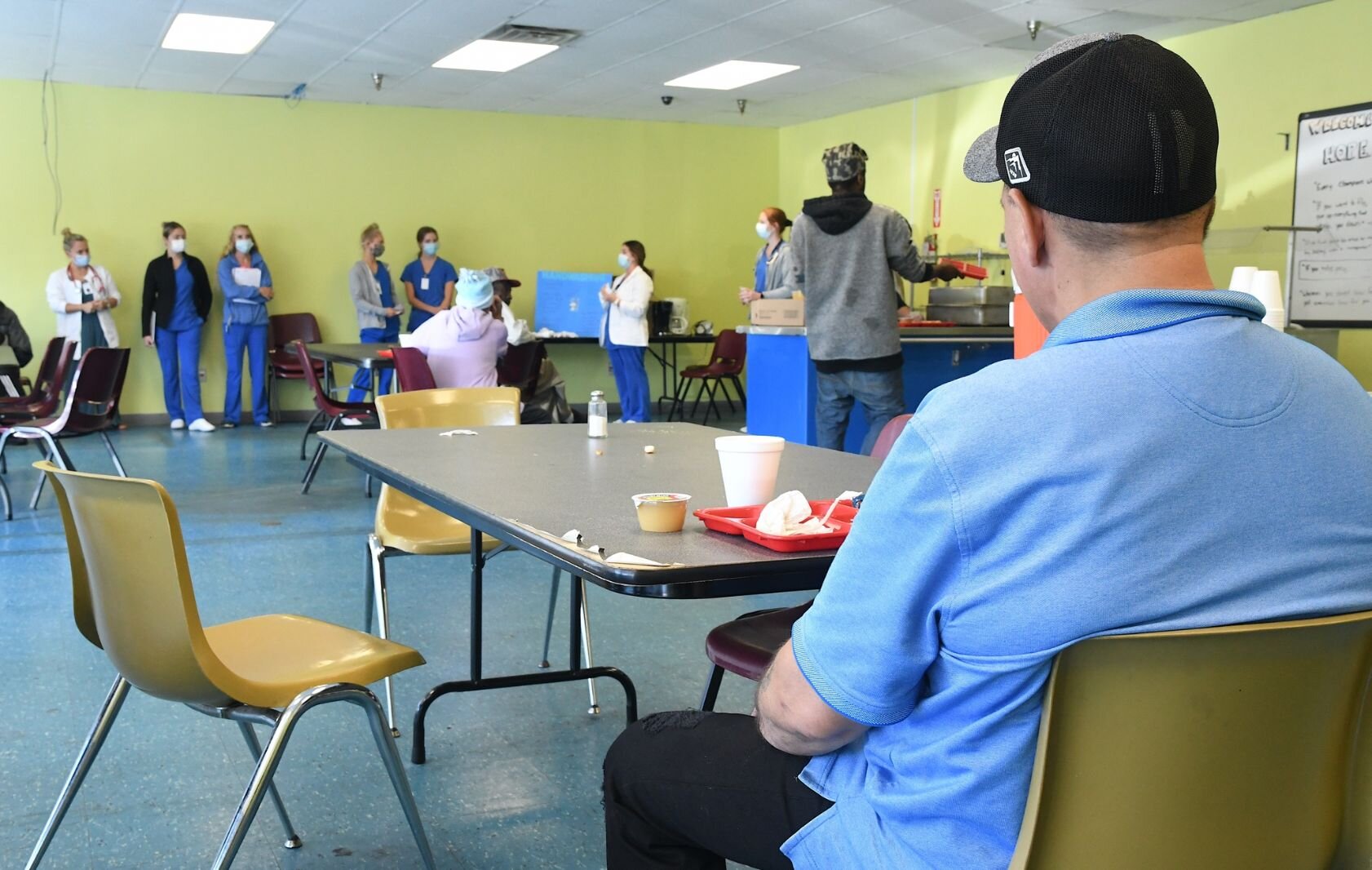
Kellogg Community College nursing students give a presentation during lunchtime at the SHARE Center.
“We initially went to FCC because the city said we couldn’t provide overnight shelter services without a special permit,” Elchert says. “Timing was of the essence and we didn’t have many options.”
Anderson says she first learned about the SHARE Center’s sprinkler system mishap while sitting next to an under-housed person during a service at the FCC.
“She told me that it was the reason she was at FCC that day, that many people who relied on the SHARE Center were displaced while repairs were being made. A few days later, Kathy Antaya, the SHARE Center’s lead volunteer said she’d been asked to do the fundraiser. I took it off her plate because I’ve done many of these fundraisers before.”
Funds earmarked for the SHARE Center’s meals program are both restricted grant funding, including funds from FEMA (Federal Emergency Management Agency) which may see a reduction or elimination of its grant program, and unrestricted donations, which is why they were able to be used for the overnight shelter, but Elchert is quick to point out that the organization he leads is “not trying to be an overnight shelter.”
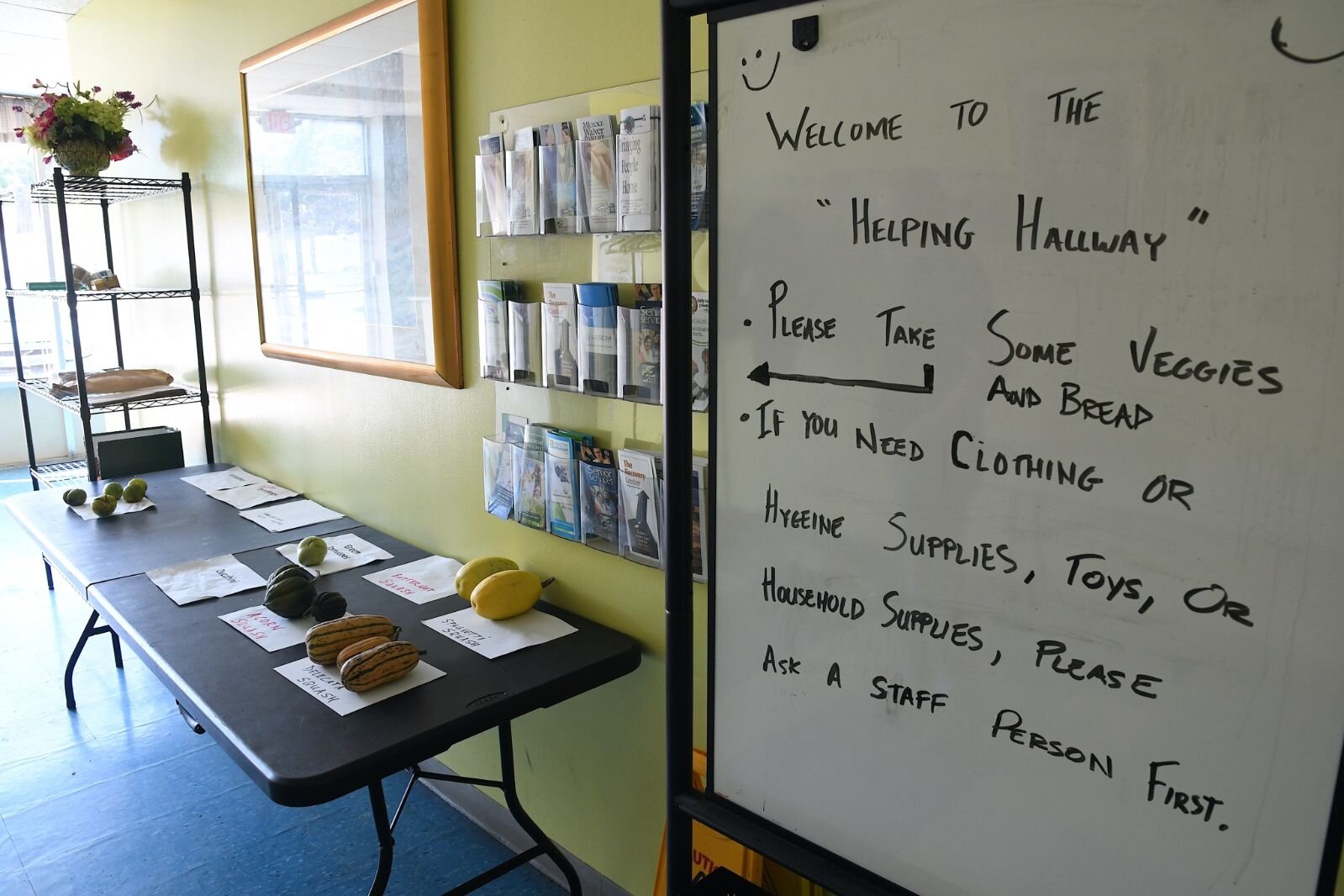
A sign on a wall at the SHARE Center tells people to help themselves to items.
The meal program receives money from various sources, including the United Way of Southcentral Michigan, and from private donations to provide breakfast, lunch, and dinner six days a week for anyone who walks through their doors. However, the amount received annually continues to decrease while the need increases.
“If it got really bad we’d have to cut some of the meal services which is unfortunate because we’re very intentional about filling in the gaps,” Elchert says.
A lot with a little
In 2024 the SHARE Center recorded 82,852 visits by 1,749 people. They also served 1,135 new clients, 280 seniors, 103 children, and 164 Veterans. The meal program served 55,734 meals to 1,607 individuals which is a 43 percent increase from 2023.
“We’re seeing the need. At the same time our funding continues to go down,” Elchert says.
“We are seeing the collapse of our social services and non-profit barriers in real-time. Unhoused people die in Battle Creek regularly already — it is usually invisible because autopsies don’t list ‘unhoused’ as a cause of death,” Anderson says.
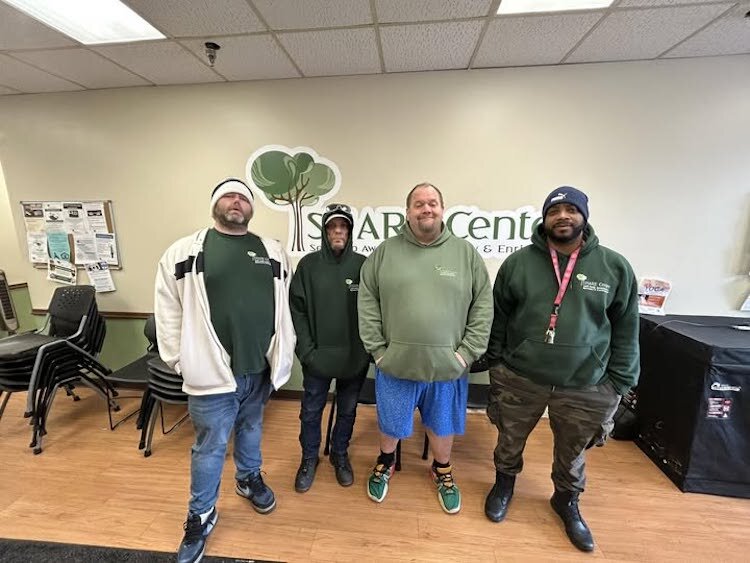
“The SHARE Center is the last hope for many people, and the organization faces a very real threat of de-funding by the Federal government, which will result in more needless suffering, more death. And we each need to remember that any number of circumstances can land us right there, needing those services ourselves. If we ensure our community is fit for the most needy among us, we’ll have a society fit for all of us.”
She likens the SHARE Center to a hub where people can connect with a variety of health, housing, and food programs in a safe and judgment-free space that helps people keep connected.
“Each unhoused or under-housed neighbor has a unique story of why they are in their current situation. I spent four years living downtown and got to know countless neighbors as I walked to work, ran errands, and played with my dog in the park. Nearly all of them relied on the SHARE Center for regular meals or for shelter from heat or cold.,”
Anderson says. “Many times, I gave people rides to the SHARE Center when they were new to town and had no resources. In our town of 50,000, it is the only secular organization that intentionally provides our under-housed neighbors with a buffer between unsafe situations and negative outcomes.”
Like many local nonprofit leaders, Elchert is very concerned about what is happening at the Federal level.
If the Federal government reduces funding, it will be incumbent on agencies like ours to meet growing needs that government programs will no longer meet,” he says. “It’s going to be some pretty scary times.”

